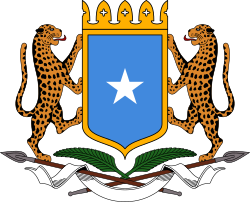 | |
| Agency overview | |
|---|---|
| Formed | 1960 |
| Jurisdiction | Somalia |
| Headquarters | Mogadishu |
| Minister responsible |
|
| Agency executive |
|
| Parent agency | Cabinet of Somalia |
| Website | moh |
The Ministry of Health and Human Services of the Federal Government of Somalia is a government agency responsible for overseeing and promoting the health and well-being of the Somali population. As a key institution within the federal government, the ministry plays a vital role in formulating and implementing policies, programs, and initiatives aimed at improving healthcare services and public health outcomes across the country.
Contents
The ministry's primary objective is to ensure equitable access to quality healthcare services for all Somali citizens. It works towards this goal by collaborating with various stakeholders, including local communities, healthcare providers, non-governmental organizations, and international partners. Through strategic planning, resource allocation, and capacity building, the ministry strives to strengthen the healthcare system, enhance healthcare delivery, and address the health needs of the population.
In addition to healthcare services, the Ministry of Health and Human Services also focuses on the promotion of preventive measures and public health awareness. This includes initiatives related to disease prevention, vaccinations, maternal and child health, sanitation, and hygiene practices. By prioritizing preventive measures, the ministry aims to reduce the burden of diseases and improve overall health outcomes in Somalia.
Moreover, the ministry actively engages in international partnerships and collaborations to leverage resources and expertise in addressing health challenges. It works closely with organizations such as the World Health Organization (WHO), United Nations Children's Fund (UNICEF), and Gavi, among others, to access funding, technical support, and best practices in healthcare.
As the central authority responsible for health and human services in Somalia, the ministry plays a crucial role in coordinating efforts at the national, regional, and local levels. It works in close collaboration with regional health authorities, local administrations, and healthcare professionals to ensure effective and efficient healthcare delivery across the country.
Overall, the Ministry of Health and Human Services of the Federal Government of Somalia is committed to improving the health and well-being of the Somali population. Through its policies, programs, and partnerships, it aims to build a resilient healthcare system that provides accessible, equitable, and high-quality healthcare services for all citizens. Somalia. [1] [2] [3]
